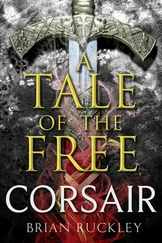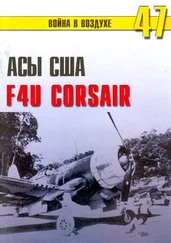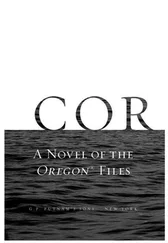Diaz led them into the city itself, guiding them along narrow lanes ankle-deep in mud. A number of the passers-by wore the grey hooded cloaks of the amazigh, but the majority were Moors or Arabs in brightly coloured jackets sewn with decorative buttons and wearing red caps. Their loose linen drawers reached down to mid calf, leaving their feet bare, a sensible arrangement given the condition of the muddy streets, though some of the wealthier ones teetered along on thick-soled cork slippers trying to steer clear of the muck. Against the damp and chill, most were swathed in a fine white blanket wrapped around the body, leaving only the right arm bare. They showed little interest in Hector and his friends, and even Karp with his damaged face attracted scarcely a second glance, which left Hector wondering if such mutilation was perhaps another of the imperial punishments.
‘This is where I live,’ announced Diaz as they reached an unprepossessing building that looked more like a cattle byre than a dwelling and, after tying up their mounts, pushed open the door. Inside, the place was no more attractive, a large room poorly furnished with a couple of tables and some plain chairs and benches. Several doors apparently led off to bedchambers, and there must have been a kitchen somewhere to the rear as Hector could smell cooking. He also noticed that the roof leaked in one corner.
‘It’s not much, I know,’ said Diaz, ‘but this is what the Emperor assigned to his Spanish officers. We were told to evict the Jew who owns the place here and, believe it or not, the Jew now has to pay rent to Moulay for letting us live here. I know it makes no sense. But you’ll find that is the rule here in Meknes. Everything is back to front.’
A trio of white men, dressed in vaguely military costume, were sitting at one of the tables, playing cards and drinking from earthenware mugs. ‘Let me introduce you to my fellow officers,’ said Diaz. ‘This is Roberto, Carlos and Lopez. Like myself, they are all cavalrymen. A couple of musketeers from Castille are also billeted here, but right now they are away on campaign. The Emperor has an army in the south, putting down a local rebellion among the mountain people, and they’ve been sent to help out. You can use their room until they return.’ He clapped his hands and shouted out for food to be brought. Somewhere to the rear of the building a voice answered him.
Over a meal of grey, stringy boiled mutton and couscous Diaz explained to his countrymen that he had brought the castaways to Meknes after hearing about the great mortar. ‘A wise decision,’ said the man called Roberto as he idly shuffled the pack of cards. ‘If Moulay had learned about the gun, and that you were nearby and failed to act, he’d have had you tossed.’ He turned towards the visitors. ‘Being tossed, for your information, does not mean being thrown out of the imperial army. It means just what it says. Being thrown up in the air, and you’ll be lucky to escape with your life when it is done by the Black Guard. They are very skilled at it. The Emperor gives the nod, and those devils step forward and grab you, one at each limb. Then they fling you up in the air, and stand back. It’s a fine art and they have it to perfection. They calculate how you will fly up in the air, how far you go, and whether you turn or spin.’ He gave a sardonic chuckle. ‘A bit like judging the way the bomb flies out from that big gun Luis just told us about. When you get tossed, the Black Guard stand back and let you crash back on the ground. They can arrange it so you fall on your face, or your back, or your side. Whatever they choose. It is up to them whether you are stunned or merely bruised, or break a leg or an arm. Then if the Emperor commands, they’ll do it several times so you are suitably battered. Or if he wants you dead, they can make sure that you land on your head at just the right angle to break your neck. It helps, of course, when they do this over a marble floor.’ He began to deal out the cards to his companions. ‘For a moment when you first came in,’ he added, looking at Dan, ‘I thought you might be a member of the Black Guard, and that gave me a fright, I must admit.’
‘Those tax collectors with you were they Black Guardsmen?’ Bourdon asked Diaz.
‘Not exactly, though one day they might become that,’ he answered. ‘Blacks are the backbone of the Emperor’s army. Some are recruited from the tribes. But the majority are bred to the service. They are the sons of soldiers who have served previous rulers, and are brought up to a military life. They are trained to be tough, live in special camps, exercise in fighting with sword and spear, and are shown how to handle a musket.’
Here one of the Spaniards interrupted. ‘Not that they use guns very much. The weapons they are given are shoddy rubbish, and likely to blow up in your face. And the powder is no better. Half the time it doesn’t explode. The Emperor’s infantry often finish up using their muskets as clubs. Still, don’t let me interrupt our friend’s yarn.’
Diaz waved his hand dismissively. ‘You may have noticed that my escort of tax collectors was lightly dressed even though we were in the mountains. That’s part of their training. They are issued only with a thin cotton shift and no footwear, not even a turban. After five years’ instruction they are considered to be fit for duty. Later, if they distinguish themselves in battle, they may advance to the elite company which protects the Emperor’s person. Then they’re Black Guards, and utterly loyal to Moulay. He has them drilled like mastiffs, vicious and ready to attack anyone.’ He stretched his legs to ease his riding muscles. ‘But enough of that. It’s time to return my horse to the imperial stables, and we might as well drop off the mules there too. You’ll see for yourself that Moulay’s cavalry get better equipment than his foot soldiers.’
Remounted, Diaz took Hector and his companions back through the muddy city streets to a great gateway in the outer wall of the royal enclosure. Its enormous doors of worked bronze stood open and, as they passed under the archway, Luis said, ‘We buried a wolf’s head here last year when this gate was used for the first time. The Emperor killed the wolf – it was from his menagerie – with a scimitar. Then he told us to bury the head in the centre of the gateway, while he himself interred the body outside in the main road. I suppose it’s meant to bring good luck.’ He turned his horse to the left as soon as they were inside the gate, explaining that it was wiser to avoid the centre of the palace compound. ‘You never know where you might run into Moulay,’ he warned. ‘He roams the palace with his escort, poking and prying into every corner. If he comes upon a work gang putting up a building, he’s been known to take off his outer robes, strip down to his shirt and seize a shovel, then work alongside them in some sort of frenzy. Equally, if he is in a bad mood and thinks someone is slacking, he’ll send in the Black Guard with cudgels and have the labourers thrashed on the spot.’
They rode for some distance when, at the far side of the compound, they entered on a broad, well-made roadway carried on a series of arches across a shallow valley. ‘I always feel a little more relaxed when I reach this point,’ admitted Diaz. ‘There’s less chance of meeting Moulay out here. The only time he’s likely to come this way is if he’s taken it into his head to go on an outing with some of his harem. He has them put up on mules and donkeys, and he rides at the head of the procession like some sort of peacock. His eunuch guards fan out ahead to clear away any onlookers, using whips and swords. But everyone who has any sense has already made himself scarce. Should you be unlucky enough to be trapped with nowhere to run, the best course is to bolt behind a bush and fall flat, with your face to the ground and hoping you are not noticed.’
Читать дальше








